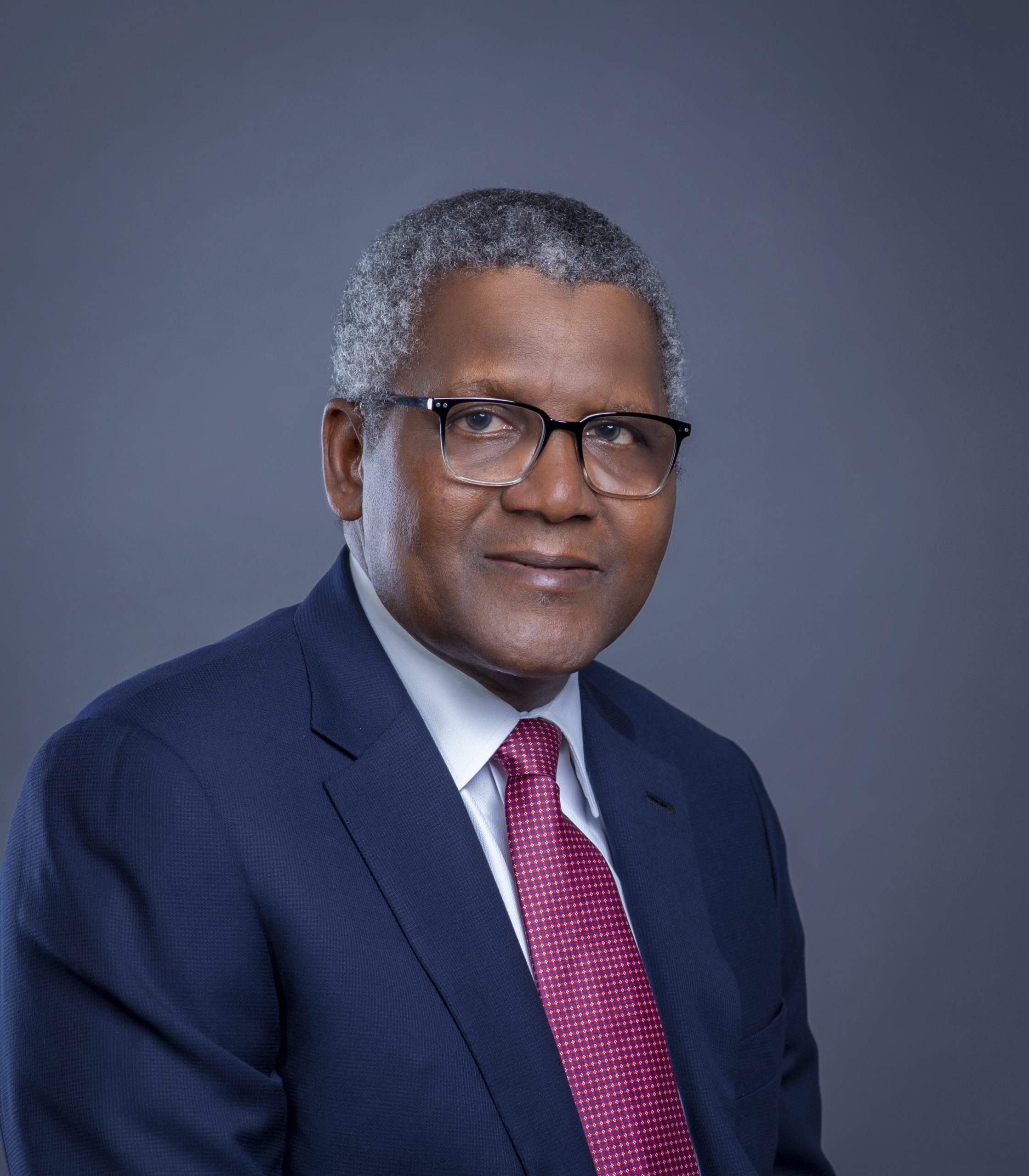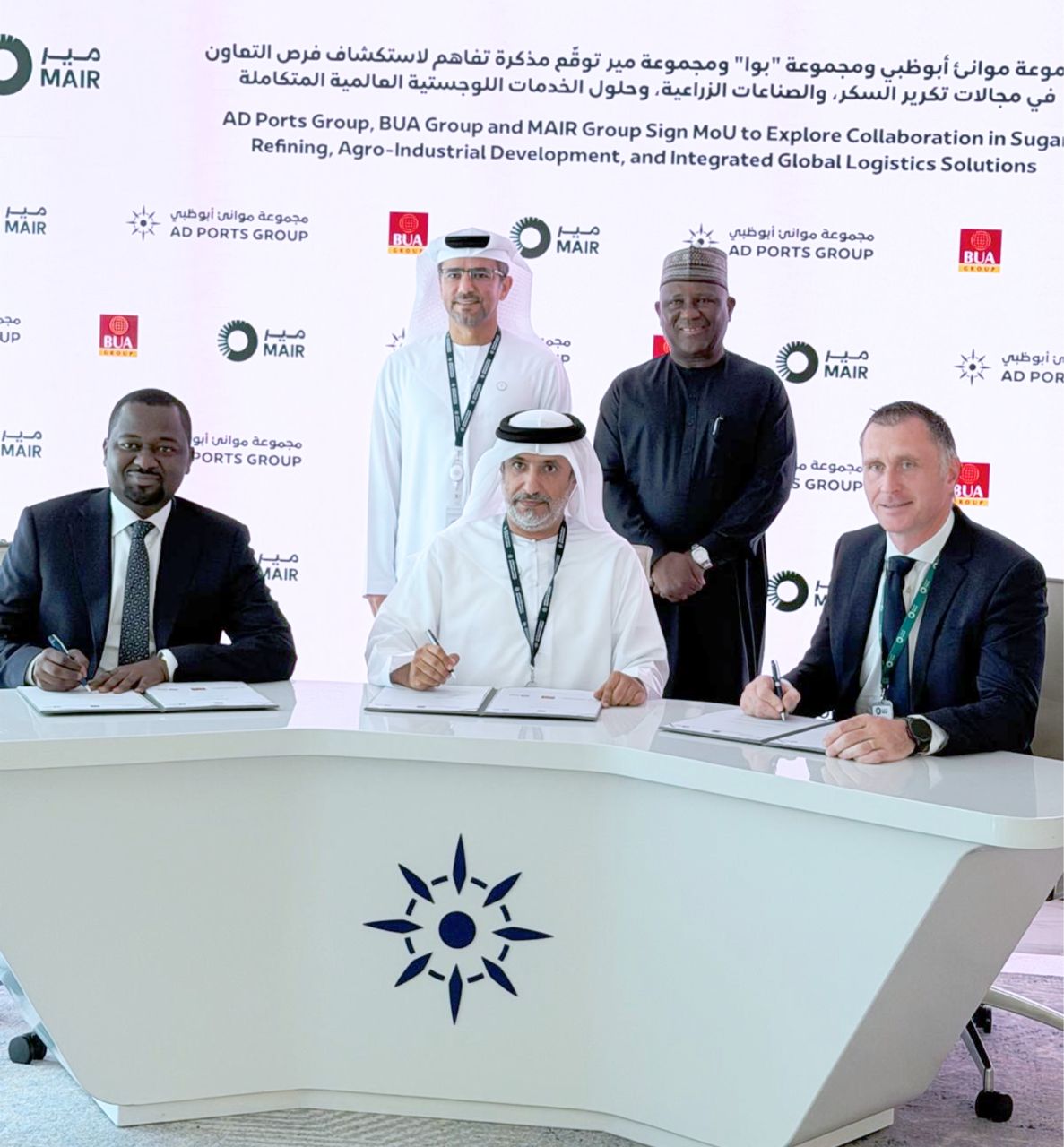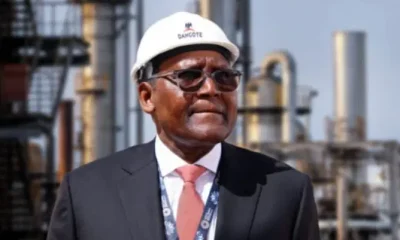Business
Dangote challenges NMDPRA, tests diesel in the presence of House Reps leadership

says “Our diesel is the best in Nigeria, meets international standard “
… lab test reveals 88ppm sulphur content in Dangote’s diesel, over 1,800ppm in imported diesel
… Speaker commends state-of-the-art technology; assures Dangote of NA’s support
President of Dangote Group, Aliko Dangote, has asserted that products refined at the Dangote Petroleum Refinery & Petrochemicals, the world’s largest single train refinery, are of superior quality compared to imported equivalents and meet international standards. He expressed his confidence, after the House leadership insisted on testing other diesel products, alongside Dangote’s diesel at its state-of-the-art laboratory.
During a tour of both Dangote Petroleum Refinery and the Dangote Fertiliser Limited complex by members of the House of Representatives, the Speaker of the House of Representatives, Rt Hon. Tajudeen Abbas and other members who observed the testing of Automotive Gas Oil (diesel) from two petrol stations alongside Dangote Petroleum Refinery, praised the company for its significant investments and contributions to Nigeria’s development.
The diesel samples were procured from two well-known filling stations near Eleko junction along the Lekki Epe Expressway, by the honourable members. Chairman of the House Committee on Downstream, Hon. Ikeagwunon Ugochinyere, and Chairman of the House Committee on Midstream, Hon. Okojie Odianosen, oversaw the collection of samples from the Mild Hydro Cracking (MHC) unit of Dangote refinery for testing of all the samples.
Lab tests revealed that Dangote’s diesel had a sulphur content of 87.6 ppm (parts per million), whereas the other two samples showed sulphur levels exceeding 1800 ppm and 2000 ppm respectively.
Dangote emphasised that these findings debunked claims made by Farouk Ahmed, CEO of the Nigerian Midstream and Downstream Petroleum Authority, who recently asserted that imported diesel surpasses domestically refined products. Ahmed had alleged that Dangote refinery and other modular refineries like Waltersmith and Aradel produced diesel with sulphur content ranging from 650 to 1200 ppm—a statement criticised by many Nigerians as a tactic to favour imported products over local ones.
Dangote openly challenged the regulator to compare the quality of refined products from his refinery with those imported, advocating for an impartial assessment to determine what best serves the interests of Nigerians.
“We produce the best diesel in Nigeria. It’s disheartening that instead of safeguarding the market, the regulator is undermining it. Our doors are open for the regulator to conduct tests on our products anytime; transparency is paramount to us. It would be beneficial for the regulator to showcase its laboratory to the world so Nigerians can compare. Our interest is Nigeria first because if Nigeria doesn’t grow, we have limited capacity for growth.
“Right Honourable Speaker and esteemed members, you’ve witnessed the results of the credibility test. I appreciate your wise counsel in procuring samples from the filling stations alongside our refinery’s product. Ours shows a sulphur content of 87.6 ppm, approximately 88, whereas the others exceeded 1,800 ppm. Although the NMDPRA permits local refiners to produce diesel with sulphur content up to 650 ppm until January 2025, as approved by ECOWAS, ours is significantly lower. Next week, we aim to achieve 10 ppm, aligning with the Euro V standard. Imported diesel is capped at 50 ppm, but as you’ve seen, those from the stations, imported by major marketers, fall well outside this standard.”
Dangote pointed out that high-sulphur content diesel regularly imported into the country often comes with dubious certifications. He emphasised that the most effective method to verify the quality is to purchase the product directly from filling stations and conduct credibility tests. According to him, this issue has resulted in both health risks and financial losses for Nigerians.
“Dubious certifications often accompany the importation of high-sulphur diesel into Nigeria, causing both health risks and financial losses for Nigerians,” noted Dangote. “The best method to verify this is to purchase the product directly from filling stations where end-users obtain it. I believe Farouk Ahmed speaks without sufficient knowledge of our refinery. We have successfully exported diesel and jet fuel to Europe and Asia without any complaints; in fact, we have received repeated orders, indicating satisfaction with our products.”
Supporting Dangote’s assertion, VP of Gas and Oil at Dangote Industries Limited, Devakumar Edwin, highlighted recent actions by European countries like Belgium and the Netherlands. “These countries have expressed concerns about the carcinogenic effects of high-sulphur diesel being dumped into the Nigerian market, prompting them to impose bans on such fuel exports to West Africa.”
Edwin informed the federal lawmakers that the Dangote Petroleum Refinery, designed to process a wide range of crudes including various African and Middle Eastern crudes, as well as US Light Tight Oil, conforms to Euro V specifications. In addition, he said, it is designed to comply with US EPA, European emission norms, Department of Petroleum Resources (DPR) emission/effluent norms, and African Refiners and Distribution Association (ARDA) standards.
Noting that products from the $20 billion facility are of high quality and meet international standards, Edwin said it has the capacity to meet 100% of Nigeria’s demand for petrol, diesel, kerosene, and aviation Jet, with surpluses available for export.
The Group’s VP, Olakunle Alake, expressed disappointment over accusations of monopoly against the Dangote Group. He stressed that there are multiple players in the industry, including the Nigerian National Petroleum Corporation (NNPC), which operates four refineries.
Expressing concern over the controversy surrounding the quality of imported refined products into Nigeria, Speaker Rt. Hon. Abass stated that the Green Chamber would establish a committee to investigate the matter thoroughly. He emphasised that sampled products from various sources would undergo testing as part of this initiative.
The Speaker also expressed admiration for the infrastructure at the Dangote Oil Refinery, describing it as a significant asset in Nigeria’s quest for self-sufficiency in petroleum products. He noted that the refinery has positioned itself as a pivotal player, especially at a time when global concerns over energy security and sustainability are paramount.
“Today’s visit to the magnificent facilities of Dangote Industries Oil Refinery section has been nothing short of enlightening. It has afforded us a rare opportunity to witness first-hand the monumental strides that your organisation has made in transforming the landscape of petroleum production in Nigeria. The sheer scale and sophistication of this facility are awe-inspiring; it stands as a beacon of hope for our country as we navigate through the turbulent waters of energy supply challenges,” he said.
Commending the state-of-the-art technology implemented at the petroleum refinery, Abbas praised it as revolutionary and a shining example of engineering and innovation excellence.
“Each corner of this facility resonates with the echoes of hard work, dedication, and an unyielding pursuit of quality. It is evident that every drop produced here carries not just oil but also the hopes and dreams of millions who yearn for a brighter future. We are deeply impressed by what we have seen during this visit which confirms the rating of this industry as the single largest oil refinery in Africa. This remarkable achievement does not merely reflect corporate success; it symbolises national pride, a tribute to what can be accompanied when visionary leadership meets relentless determination,” he said.
Acknowledging the numerous challenges likely encountered during the construction of the refinery, the Speaker lauded Dangote for his steadfast commitment to achieving excellence.
“I would like to take this opportunity to acknowledge the myriad challenges that have beset this remarkable facility. The regulatory hurdles that often loom like dark clouds over progress, the complexities surrounding crude oil supplies that can stifle even the most ambitious endeavours, and the daunting economic landscape we navigate especially in these times when our economy grapples with foreign exchange constraints are all formidable adversaries. Yet, despite these tribulations, your unwavering commitment to excellence shines through,” he attested.
Bank
Alpha Morgan to Host 19th Economic Review Webinar

Alpha Morgan to Host 19th Economic Review Webinar
In an economy shaped by constant shifts, the edge often belongs to those with the right information.
On Wednesday, February 25, 2026, Alpha Morgan Bank will host the 19th edition of its Economic Review Webinar, a high-level thought leadership session designed to equip businesses, investors, and individuals with timely financial and economic insight.
The session, which will hold live on Zoom at 10:00am WAT and will feature economist Bismarck Rewane, who will examine the key signals influencing Nigeria’s economic direction in 2026, including policy trends, market movements, and global developments shaping the local landscape.
With a consistent track record of delivering clarity in uncertain times, the Alpha Morgan Economic Review continues to provide practical context for decision-making in a dynamic environment.
Registration for the 19th Alpha Morgan Economic Review is free and can be completed via https://bit.ly/registeramerseries19
It is a bi-monthly platform that is open to the public and is held virtually.
Visit www.alphamorganbank to know more.
Business
GTBank Launches Quick Airtime Loan at 2.95%

GTBank Launches Quick Airtime Loan at 2.95%
Guaranty Trust Bank Ltd (GTBank), the flagship banking franchise of GTCO Plc, Africa’s leading financial services group, today announced the launch of Quick Airtime Loan, an innovative digital solution that gives customers instant access to airtime when they run out of call credit and have limited funds in their bank accounts, ensuring customers can stay connected when it matters most.
In today’s always-on world, running out of airtime is more than a minor inconvenience. It can mean missed opportunities, disrupted plans, and lost connections, often at the very moment when funds are tight, and options are limited. Quick Airtime Loan was created to solve this problem, offering customers instant access to airtime on credit, directly from their bank. With Quick Airtime Loan, eligible GTBank customers can access from ₦100 and up to ₦10,000 by dialing *737*90#. Available across all major mobile networks in Nigeria, the service will soon expand to include data loans, further strengthening its proposition as a reliable on-demand platform.
For years, the airtime credit market has been dominated by Telcos, where charges for this service are at 15%. GTBank is now changing the narrative by offering a customer-centric, bank-led digital alternative priced at 2.95%. Built on transparency, convenience and affordability, Quick Airtime Loan has the potential to broaden access to airtime, deliver meaningful cost savings for millions of Nigerians, and redefine how financial services show up in everyday life, not just in banking moments.
Commenting on the product launch, Miriam Olusanya, Managing Director of Guaranty Trust Bank Ltd, said: “Quick Airtime Loan reflects GTBank’s continued focus on delivering digital solutions that are relevant, accessible, and built around real customer needs. The solution underscores the power of a connected financial ecosystem, combining GTBank’s digital reach and lending expertise with the capabilities of HabariPay to deliver a smooth, end-to-end experience. By leveraging unique strengths across the Group, we are able to accelerate innovation, strengthen execution, and deliver a more integrated customer experience across all our service channels.”
Importantly, Quick Airtime Loan highlights GTCO’s evolution as a fully diversified financial services group. Leveraging HabariPay’s Squad, the solution reinforces the Group’s ecosystem proposition by bringing together banking, payment technology, and digital channels to deliver intuitive, one-stop experiences for customers.
With this new product launch, Guaranty Trust Bank is extending its legacy of pioneering digital-first solutions that have redefined customer access to financial services across the industry, building on the proven strength of its widely adopted QuickCredit offering and the convenience of the Bank’s iconic *737# USSD Banking platform.
About Guaranty Trust Bank
Guaranty Trust Bank (GTBank) is the flagship banking franchise of GTCO Plc, a leading financial services group with a strong presence across Africa and the United Kingdom. The Bank is widely recognized for its leadership in digital banking, customer experience, and innovative financial solutions that deliver value to individuals, businesses, and communities.
About HabariPay
HabariPay is the payments fintech subsidiary of GTCO Plc, focused on enabling fast, secure, and accessible digital payments for individuals and businesses. By integrating payments and digital technology, HabariPay supports innovative services that make everyday financial interactions simpler and more seamless.
Enquiries:
GTCO
Group Corporate Communication
[email protected]
+234-1-2715227
www.gtcoplc.com
Business
BUA Group, AD Ports Group and MAIR Group Launch Strategic Plan for World-Class Sugar and Agro-Logistics Hub at Khalifa Port

BUA Group, AD Ports Group and MAIR Group Sign MoU to Explore Collaboration in Sugar Refining, Agro-Industrial Development, and Integrated Global Logistics Solutions
Abu Dhabi, UAE – Monday, 16th February 2026
BUA Group, AD Ports Group, and MAIR Group of Abu Dhabi today signed a strategic Memorandum of Understanding (MoU) to explore collaboration in sugar refining, agro-industrial development, and integrated global logistics solutions. The partnership aims to create a world-class platform that strengthens regional food security, supports industrial diversification, and reinforces Abu Dhabi’s position as a hub for trade and manufacturing.
The proposed collaboration will leverage BUA Group’s industrial and logistics expertise, Khalifa Port’s world-class infrastructure, and AD Ports Group’s operational experience. The initiative aligns with the objectives of the UAE Food Security Strategy 2051, which seeks to position the UAE as a global leader in sustainable food production and resilient supply chains. It also aligns with Nigeria’s food production- and export-oriented agricultural transformation agenda, focused on scaling domestic capacity, strengthening value addition, improving post-harvest logistics, and unlocking new markets for Nigerian produce across the Middle East, Asia, and beyond.

Photo Caption: L-R: Kabiru Rabiu, Group Executive Director, BUA Group; Cpt. Mohammed J. Al Shamisi, MD/Group CEO, AD Ports Group; Saif Al Mazrouei, CEO (Ports Cluster) AD Ports Group; Abdul Samad Rabiu, Founder/Executive Chairman, BUA Group; and Steve Green, Group CFO, MAIR Group
Through structured aggregation, processing, storage, and maritime export channels, the partnership is designed to reduce supply chain inefficiencies, enhance traceability and quality standards, and also create a predictable trade corridor between West Africa and the Gulf.
BUA Group—recognised as one of Africa’s largest and most diversified conglomerates, with major investments across sugar refining, food production, flour milling, cement manufacturing, and infrastructure- brings extensive industrial expertise and large-scale operational capability to the venture. MAIR Group will provide strategic support in developing integrated logistics and agro-industrial solutions, creating a seamless platform for production, storage, and distribution.
Abdul Samad Rabiu, Founder and Chairman of BUA Group, said:
“This MoU marks an important milestone in BUA’s international expansion and reflects our long-term vision of building globally competitive industrial platforms. Together with AD Ports Group and MAIR Group, we aim to develop sustainable food production and logistics solutions that strengthen regional supply chains and support the UAE’s Food Security Strategy 2051.”
He further added that, “This partnership represents not just a commercial arrangement but a strategic food corridor anchored on shared economic ambition, resilient infrastructure, and disciplined execution, reinforcing long-term food security objectives for both nations.”
A representative of MAIR Group added:
“This collaboration underscores our commitment to advancing strategic industries in Abu Dhabi and building integrated solutions that reinforce the UAE’s position as a global hub for trade, food security, and industrial excellence.”
A spokesperson from AD Ports Group commented:
“Our partnership with BUA Group and MAIR Group highlights Khalifa Port’s role as a catalyst for high-impact industrial investments. This initiative will enhance regional food security, strengthen global trade connectivity, and support Abu Dhabi’s economic diversification goals.”
This MoU marks a historic collaboration that combines world-class infrastructure, industrial expertise, and strategic vision, setting the stage for a sustainable and resilient food and logistics ecosystem that will benefit the UAE, the region, and global markets alike.
-

 celebrity radar - gossips6 months ago
celebrity radar - gossips6 months agoWhy Babangida’s Hilltop Home Became Nigeria’s Political “Mecca”
-

 society6 months ago
society6 months agoPower is a Loan, Not a Possession: The Sacred Duty of Planting People
-

 society5 months ago
society5 months agoReligion: Africa’s Oldest Weapon of Enslavement and the Forgotten Truth
-

 news6 months ago
news6 months agoTHE APPOINTMENT OF WASIU AYINDE BY THE FEDERAL GOVERNMENT AS AN AMBASSADOR SOUNDS EMBARRASSING








